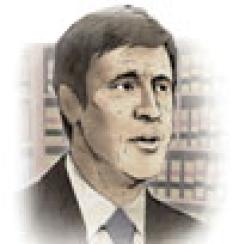Marriott International
Age: 50
Year Named CFO: 1998
2008 Earnings: $362 million
Number of Employees: 146,000
Compensation: $2,036,314
Stock Options: $2,650,803

ONE VOTER: “Arne is the type of CFO investors love to have on board, because you have confidence he’s keeping a close watch on the ship.”
Business travel and vacation plans are often the first thing to get scrapped during a time of financial strain. Just ask Arne Sorenson, the CFO of hotel operator Marriott International. The company began to experience a softening in demand for its lodgings in the summer of 2007, when the credit crisis first erupted. Then the bottom fell out last autumn, after the collapse of Lehman Brothers Holdings sent the global economy into a tailspin.
Revenue per available room, a key industry metric, plunged by 20 percent in the first quarter of this year from a year earlier. The company posted a net loss of $25 million in the first quarter, compared with earnings of $84 million in the same period a year earlier.
Sorenson, who steps up this month to take on the posts of president and COO, replacing William Shaw, who is becoming vice chairman, has gotten deeply involved in the company’s operations in an effort to enforce strict cost reductions. “You can not successfully deal with the strategic questions without being steeped in the day-to-day issues we wrestle with,” he says.
Marriott has laid off some employees, cut hours and pay for others — including a 10 percent salary cut for management — and shut down floors at some hotels to slash costs. Such measures helped reduce general and administrative expenses by 16 percent in the first quarter.
The hotelier is also cutting investment spending to $350 million to $400 million this year from $950 million in 2008 by cutting hotel development and not starting any new time-share projects. To bolster its revenue stream, the company is looking to increase use of promotional activities, the Marriott Rewards program and the Marriott.com Web site. “We are going to fight tooth and nail on the revenue side for as much incremental business and market share as we can get,” Sorenson says.
Investors seem to be on board with the strategy. “Arne has a good grasp of the entire global operations and can articulate Marriott’s strategy from an operational perspective as well as a financial perspective,” says one enthusiastic money manager.
Companies can’t be too vigilant in the current climate, says Sorenson. Marriott’s management now holds its traditionally annual budget planning processes several times a year. “We are much more dramatically revisiting decisions we thought we had already made,” he notes. The company has stopped giving the usual earnings guidance, but it does provide investors with detailed forecasting information, including a projection that revenue per available room will decline as much as 20 percent this year in the U.S. and 16 percent internationally.
Click on the names below to view their individual profiles.
Louis Baldwin, XTO Energy
Kevin March, Texas Instruments
William Wheeler, MetLife
To read the main article, click on America's Best CFOs Get Tough in Crisis
Click here to view the complete rankings of America's Best CFOs





